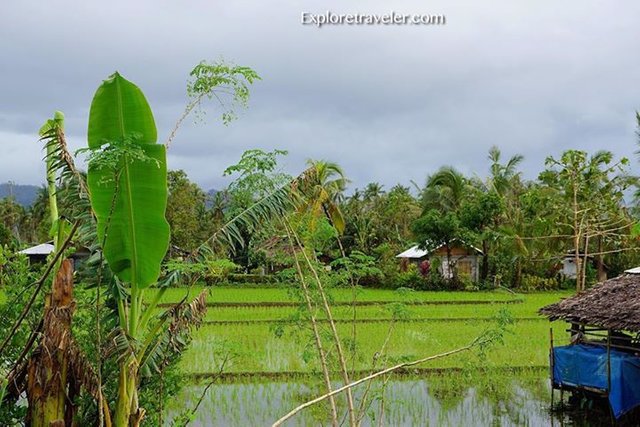Rice Farms OF Southern Leyte Philippines

Rice Farms In The Silago Evergreen Lowland
Rice farms traditionally are found in the Evergreen Lowlands of Leyte, Philippines. The lowland farmers plant rice at the beginning of the rainy season. It is then allowed to grow with minimum assistance for subsistence farming. The Silago Evergreen Lowland is renowned as one of rice bowls of the world. Temperatures during the rainy season are conducive to growing a productive crop. This beautiful evergreen lowland is not, however, a major tourist area. Though in many ways, it is one of the most authentic regions in the Leyte, Philippines. In the lowlands the rhythm of daily life is driven by the sowing and harvesting of grain. It sways to the tune of the rainy and dry seasons. Traditional Filipino life is the hallmark of the Silago Evergreen Lowlands. Ponder the myths and legends of the people. Discover the under-currents of village life. Explore the native rain-forests.
Rice In The World
Rice is one of the most widely grown and eaten cereals in the world. It is considered a staple food for much of the human population. In most of Asia it is eaten daily. It is the third largest agricultural commodity in the world. Only sugar cane and maize outrank rice in world production. Here in the Silago Evergreen lowlands, rice farming contributes to the daily beat of life. It is the key to the harmony and tranquility of Silago. Within Silago you will discover paddies that stretch as far as the eye can see. With-in the lowlands you will discover the roots of what you eat. Visit the paddies for a glimpse into the world of rice.
Rice Preparation Is Precise Throughout The World
No matter where this grain is prepared, it is generally soaked. It is the soaking that decreases cooking time. A well soaked grain conserves fuel. Grains that have been soaked have less stickiness. This grain is generally soaked for 30 minutes to several hours. A well soaked grain allows minimum exposure to higher temperatures. Soaking greatly improves the texture of the cooked rice. Soaking and rinsing until the water is clear reduces the natural starch found in the grain. Brown rice is often soaked for up to 20 hours to stimulate the germination of the grain. Germination improves the nutritional value of brown rice.
Tourism In The Silago Evergreen Lowlands
Nature Conservation is beginning to spring up. Traditional indigenous villages are beginning to captivate the interest of Eco-tourists. Divers, by far, make up the largest group of tourists in the area. Many divers are beginning to add on a side trip into this tranquil and harmonious region. Walk the beautiful white sand beaches. Explore the forests. Discover a traditional way of life. Watch as it keeps tune to the land. It is this natural rhythm that captivates tourists seeking to see a more traditional Philippines. It is the drum beat of the farmer. The rhythm of the rain. The song of the wind. All this and more, draws you to the beautiful Silago Evergreen Lowlands.

ExploreTraveler has been creating travel articles, books, videos, and podcasts for several years now. It is our intention to bring our older material for others here to enjoy here on Steemit, and to create new material here as well. We invite you to click on our links to the original content, and to also follow us there as well. This post was originally posted on Sept. 4, 2015 at:
https://exploretraveler.com/rice-farms-of-southern-leyte-philippines/
Twitter Page, ExploreTraveler
Facebook Page, ExploreTraveler
"Helping bring the world together one friend at a time. So travel
and discover that the world is full of wonderful people." - ExploreTraveler
We have a travel tip audio book that you can purchase at Audible --> Here
Happy Travels,
ExploreTraveler.com

© 2018 ExploreTraveler. All Rights Reserved
Upvoted and resteemed!
Upvoted and re esteemed